Sujit Gujar
Optimal Strategies for Federated Learning Maintaining Client Privacy
Jan 24, 2025



Abstract:Federated Learning (FL) emerged as a learning method to enable the server to train models over data distributed among various clients. These clients are protective about their data being leaked to the server, any other client, or an external adversary, and hence, locally train the model and share it with the server rather than sharing the data. The introduction of sophisticated inferencing attacks enabled the leakage of information about data through access to model parameters. To tackle this challenge, privacy-preserving federated learning aims to achieve differential privacy through learning algorithms like DP-SGD. However, such methods involve adding noise to the model, data, or gradients, reducing the model's performance. This work provides a theoretical analysis of the tradeoff between model performance and communication complexity of the FL system. We formally prove that training for one local epoch per global round of training gives optimal performance while preserving the same privacy budget. We also investigate the change of utility (tied to privacy) of FL models with a change in the number of clients and observe that when clients are training using DP-SGD and argue that for the same privacy budget, the utility improved with increased clients. We validate our findings through experiments on real-world datasets. The results from this paper aim to improve the performance of privacy-preserving federated learning systems.
FROC: Building Fair ROC from a Trained Classifier
Dec 19, 2024



Abstract:This paper considers the problem of fair probabilistic binary classification with binary protected groups. The classifier assigns scores, and a practitioner predicts labels using a certain cut-off threshold based on the desired trade-off between false positives vs. false negatives. It derives these thresholds from the ROC of the classifier. The resultant classifier may be unfair to one of the two protected groups in the dataset. It is desirable that no matter what threshold the practitioner uses, the classifier should be fair to both the protected groups; that is, the $\mathcal{L}_p$ norm between FPRs and TPRs of both the protected groups should be at most $\varepsilon$. We call such fairness on ROCs of both the protected attributes $\varepsilon_p$-Equalized ROC. Given a classifier not satisfying $\varepsilon_1$-Equalized ROC, we aim to design a post-processing method to transform the given (potentially unfair) classifier's output (score) to a suitable randomized yet fair classifier. That is, the resultant classifier must satisfy $\varepsilon_1$-Equalized ROC. First, we introduce a threshold query model on the ROC curves for each protected group. The resulting classifier is bound to face a reduction in AUC. With the proposed query model, we provide a rigorous theoretical analysis of the minimal AUC loss to achieve $\varepsilon_1$-Equalized ROC. To achieve this, we design a linear time algorithm, namely \texttt{FROC}, to transform a given classifier's output to a probabilistic classifier that satisfies $\varepsilon_1$-Equalized ROC. We prove that under certain theoretical conditions, \texttt{FROC}\ achieves the theoretical optimal guarantees. We also study the performance of our \texttt{FROC}\ on multiple real-world datasets with many trained classifiers.
Fairness of Exposure in Online Restless Multi-armed Bandits
Feb 09, 2024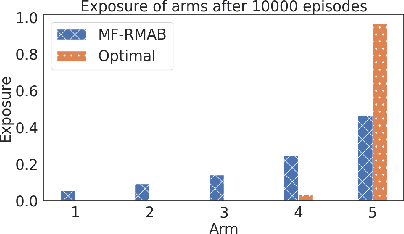
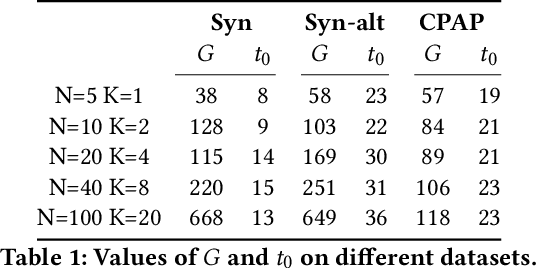


Abstract:Restless multi-armed bandits (RMABs) generalize the multi-armed bandits where each arm exhibits Markovian behavior and transitions according to their transition dynamics. Solutions to RMAB exist for both offline and online cases. However, they do not consider the distribution of pulls among the arms. Studies have shown that optimal policies lead to unfairness, where some arms are not exposed enough. Existing works in fairness in RMABs focus heavily on the offline case, which diminishes their application in real-world scenarios where the environment is largely unknown. In the online scenario, we propose the first fair RMAB framework, where each arm receives pulls in proportion to its merit. We define the merit of an arm as a function of its stationary reward distribution. We prove that our algorithm achieves sublinear fairness regret in the single pull case $O(\sqrt{T\ln T})$, with $T$ being the total number of episodes. Empirically, we show that our algorithm performs well in the multi-pull scenario as well.
Simultaneously Achieving Group Exposure Fairness and Within-Group Meritocracy in Stochastic Bandits
Feb 08, 2024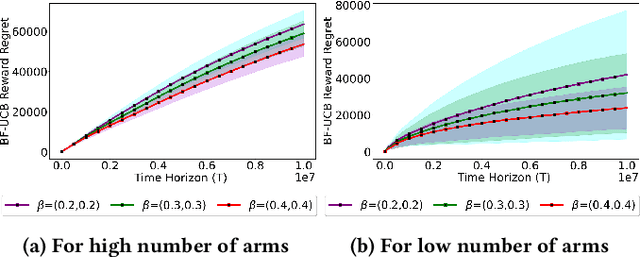
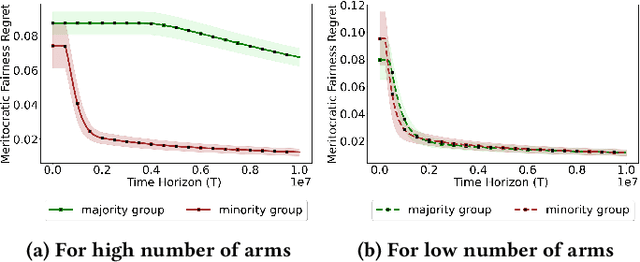

Abstract:Existing approaches to fairness in stochastic multi-armed bandits (MAB) primarily focus on exposure guarantee to individual arms. When arms are naturally grouped by certain attribute(s), we propose Bi-Level Fairness, which considers two levels of fairness. At the first level, Bi-Level Fairness guarantees a certain minimum exposure to each group. To address the unbalanced allocation of pulls to individual arms within a group, we consider meritocratic fairness at the second level, which ensures that each arm is pulled according to its merit within the group. Our work shows that we can adapt a UCB-based algorithm to achieve a Bi-Level Fairness by providing (i) anytime Group Exposure Fairness guarantees and (ii) ensuring individual-level Meritocratic Fairness within each group. We first show that one can decompose regret bounds into two components: (a) regret due to anytime group exposure fairness and (b) regret due to meritocratic fairness within each group. Our proposed algorithm BF-UCB balances these two regrets optimally to achieve the upper bound of $O(\sqrt{T})$ on regret; $T$ being the stopping time. With the help of simulated experiments, we further show that BF-UCB achieves sub-linear regret; provides better group and individual exposure guarantees compared to existing algorithms; and does not result in a significant drop in reward with respect to UCB algorithm, which does not impose any fairness constraint.
Fairness and Privacy Guarantees in Federated Contextual Bandits
Feb 05, 2024Abstract:This paper considers the contextual multi-armed bandit (CMAB) problem with fairness and privacy guarantees in a federated environment. We consider merit-based exposure as the desired fair outcome, which provides exposure to each action in proportion to the reward associated. We model the algorithm's effectiveness using fairness regret, which captures the difference between fair optimal policy and the policy output by the algorithm. Applying fair CMAB algorithm to each agent individually leads to fairness regret linear in the number of agents. We propose that collaborative -- federated learning can be more effective and provide the algorithm Fed-FairX-LinUCB that also ensures differential privacy. The primary challenge in extending the existing privacy framework is designing the communication protocol for communicating required information across agents. A naive protocol can either lead to weaker privacy guarantees or higher regret. We design a novel communication protocol that allows for (i) Sub-linear theoretical bounds on fairness regret for Fed-FairX-LinUCB and comparable bounds for the private counterpart, Priv-FairX-LinUCB (relative to single-agent learning), (ii) Effective use of privacy budget in Priv-FairX-LinUCB. We demonstrate the efficacy of our proposed algorithm with extensive simulations-based experiments. We show that both Fed-FairX-LinUCB and Priv-FairX-LinUCB achieve near-optimal fairness regret.
Designing Redistribution Mechanisms for Reducing Transaction Fees in Blockchains
Jan 24, 2024Abstract:Blockchains deploy Transaction Fee Mechanisms (TFMs) to determine which user transactions to include in blocks and determine their payments (i.e., transaction fees). Increasing demand and scarce block resources have led to high user transaction fees. As these blockchains are a public resource, it may be preferable to reduce these transaction fees. To this end, we introduce Transaction Fee Redistribution Mechanisms (TFRMs) -- redistributing VCG payments collected from such TFM as rebates to minimize transaction fees. Classic redistribution mechanisms (RMs) achieve this while ensuring Allocative Efficiency (AE) and User Incentive Compatibility (UIC). Our first result shows the non-triviality of applying RM in TFMs. More concretely, we prove that it is impossible to reduce transaction fees when (i) transactions that are not confirmed do not receive rebates and (ii) the miner can strategically manipulate the mechanism. Driven by this, we propose \emph{Robust} TFRM (\textsf{R-TFRM}): a mechanism that compromises on an honest miner's individual rationality to guarantee strictly positive rebates to the users. We then introduce \emph{robust} and \emph{rational} TFRM (\textsf{R}$^2$\textsf{-TFRM}) that uses trusted on-chain randomness that additionally guarantees miner's individual rationality (in expectation) and strictly positive rebates. Our results show that TFRMs provide a promising new direction for reducing transaction fees in public blockchains.
A Novel Demand Response Model and Method for Peak Reduction in Smart Grids -- PowerTAC
Feb 24, 2023Abstract:One of the widely used peak reduction methods in smart grids is demand response, where one analyzes the shift in customers' (agents') usage patterns in response to the signal from the distribution company. Often, these signals are in the form of incentives offered to agents. This work studies the effect of incentives on the probabilities of accepting such offers in a real-world smart grid simulator, PowerTAC. We first show that there exists a function that depicts the probability of an agent reducing its load as a function of the discounts offered to them. We call it reduction probability (RP). RP function is further parametrized by the rate of reduction (RR), which can differ for each agent. We provide an optimal algorithm, MJS--ExpResponse, that outputs the discounts to each agent by maximizing the expected reduction under a budget constraint. When RRs are unknown, we propose a Multi-Armed Bandit (MAB) based online algorithm, namely MJSUCB--ExpResponse, to learn RRs. Experimentally we show that it exhibits sublinear regret. Finally, we showcase the efficacy of the proposed algorithm in mitigating demand peaks in a real-world smart grid system using the PowerTAC simulator as a test bed.
Combinatorial Civic Crowdfunding with Budgeted Agents: Welfare Optimality at Equilibrium and Optimal Deviation
Nov 25, 2022Abstract:Civic Crowdfunding (CC) uses the ``power of the crowd'' to garner contributions towards public projects. As these projects are non-excludable, agents may prefer to ``free-ride,'' resulting in the project not being funded. For single project CC, researchers propose to provide refunds to incentivize agents to contribute, thereby guaranteeing the project's funding. These funding guarantees are applicable only when agents have an unlimited budget. This work focuses on a combinatorial setting, where multiple projects are available for CC and agents have a limited budget. We study certain specific conditions where funding can be guaranteed. Further, funding the optimal social welfare subset of projects is desirable when every available project cannot be funded due to budget restrictions. We prove the impossibility of achieving optimal welfare at equilibrium for any monotone refund scheme. We then study different heuristics that the agents can use to contribute to the projects in practice. Through simulations, we demonstrate the heuristics' performance as the average-case trade-off between welfare obtained and agent utility.
Differentially Private Federated Combinatorial Bandits with Constraints
Jun 27, 2022
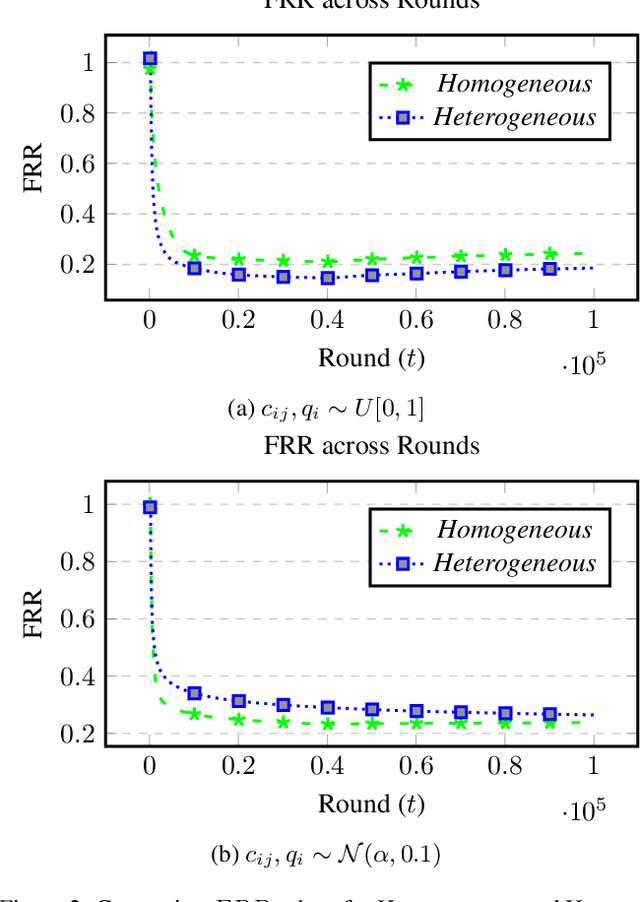
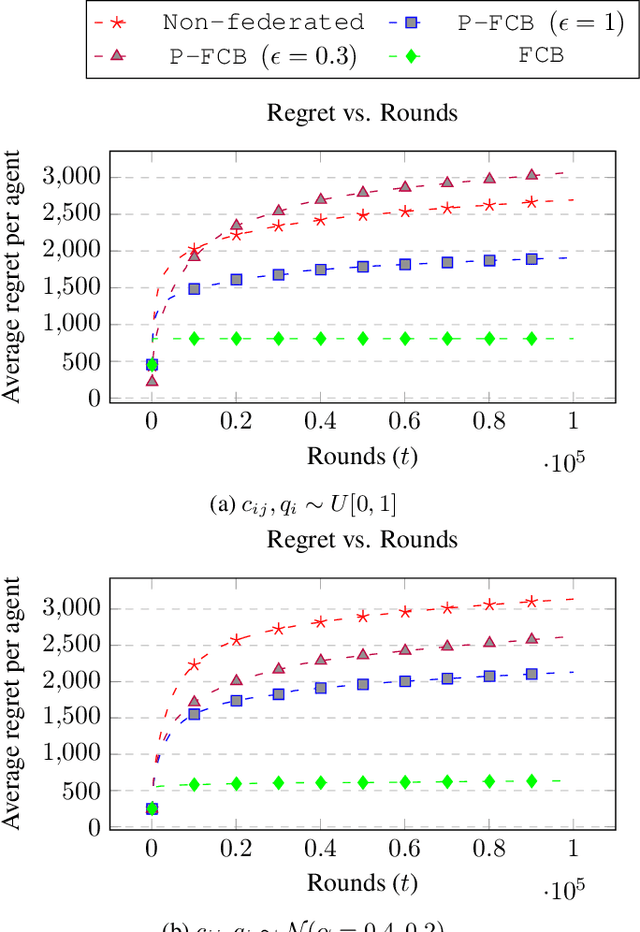

Abstract:There is a rapid increase in the cooperative learning paradigm in online learning settings, i.e., federated learning (FL). Unlike most FL settings, there are many situations where the agents are competitive. Each agent would like to learn from others, but the part of the information it shares for others to learn from could be sensitive; thus, it desires its privacy. This work investigates a group of agents working concurrently to solve similar combinatorial bandit problems while maintaining quality constraints. Can these agents collectively learn while keeping their sensitive information confidential by employing differential privacy? We observe that communicating can reduce the regret. However, differential privacy techniques for protecting sensitive information makes the data noisy and may deteriorate than help to improve regret. Hence, we note that it is essential to decide when to communicate and what shared data to learn to strike a functional balance between regret and privacy. For such a federated combinatorial MAB setting, we propose a Privacy-preserving Federated Combinatorial Bandit algorithm, P-FCB. We illustrate the efficacy of P-FCB through simulations. We further show that our algorithm provides an improvement in terms of regret while upholding quality threshold and meaningful privacy guarantees.
Budgeted Combinatorial Multi-Armed Bandits
Feb 13, 2022
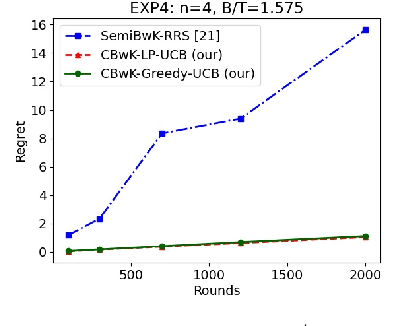
Abstract:We consider a budgeted combinatorial multi-armed bandit setting where, in every round, the algorithm selects a super-arm consisting of one or more arms. The goal is to minimize the total expected regret after all rounds within a limited budget. Existing techniques in this literature either fix the budget per round or fix the number of arms pulled in each round. Our setting is more general where based on the remaining budget and remaining number of rounds, the algorithm can decide how many arms to be pulled in each round. First, we propose CBwK-Greedy-UCB algorithm, which uses a greedy technique, CBwK-Greedy, to allocate the arms to the rounds. Next, we propose a reduction of this problem to Bandits with Knapsacks (BwK) with a single pull. With this reduction, we propose CBwK-LPUCB that uses PrimalDualBwK ingeniously. We rigorously prove regret bounds for CBwK-LP-UCB. We experimentally compare the two algorithms and observe that CBwK-Greedy-UCB performs incrementally better than CBwK-LP-UCB. We also show that for very high budgets, the regret goes to zero.
 Add to Chrome
Add to Chrome Add to Firefox
Add to Firefox Add to Edge
Add to Edge